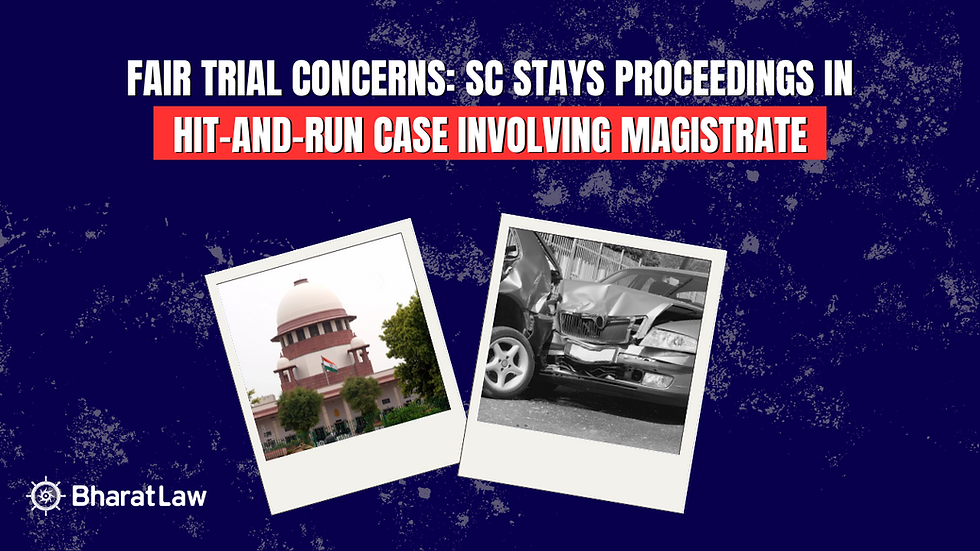Justice Cannot Be Sacrificed at the Altar of Procedural Rigidities: Supreme Court on Legal Heir Impleadment and Succession Rights
- Chintan Shah

- Mar 1, 2025
- 4 min read
Updated: Mar 3, 2025
Summary of the Judgment
Case Name: Pappammal (Died) Through LR R. Krsna Murtii v. Jothi & Anr
Date of Judgment: 27th February 2025
Judges: Hon'ble Justice Sudhanshu Dhulia and Hon'ble Justice Prashant Kumar Mishra
Advocates: Representation from both the appellant and the respondents, including government counsel
Acts & Sections Involved: Civil Procedure Code, 1908 (Order XXII Rule 5, Order I Rule 10(2))
Cited Judgments: Various precedents on legal representatives and impleadment in civil suits
Introduction
The Supreme Court of India, in its judgment in Pappammal (Died) Through LR R. Krsna Murtii v. Jothi & Anr, addressed the issue of substitution and impleadment of legal representatives in a civil suit. The case revolved around the inheritance of property and whether a sibling of the deceased plaintiff had the right to be impleaded as a defendant in an ongoing suit. The judgment reaffirms essential principles of natural justice, inheritance rights, and trial court procedures.
Background of the Case
The original plaintiff, Pappammal, had filed O.S. No. 155 of 2017 for declaration and recovery of possession against one R. R. Jagadesan. However, during the pendency of the suit, Pappammal passed away on 10.01.2020. The appellant, R. Krsna Murtii, moved to substitute himself as the legal representative based on a registered will dated 13.06.2016, executed in his favour. The trial court dismissed this application due to the absence of a legal heir certificate and the need to implead all other heirs.
After multiple rounds of litigation, the Supreme Court had earlier set aside the High Court and Trial Court orders in 2022, directing reconsideration. However, another legal heir—Jothi, the appellant’s sister—later sought to implead herself as a defendant in the suit, which was allowed by the Trial Court and affirmed by the High Court. Aggrieved, the appellant approached the Supreme Court once again.
Key Legal Issues Examined
1. Substitution of Legal Representatives
The Supreme Court examined whether R. Krsna Murtii could claim exclusive substitution based on the will executed by Pappammal. The Court reaffirmed that under Order XXII Rule 5 CPC, the substitution process must ensure all necessary parties are heard before reaching a decision on inheritance claims.
"The entire purpose of a trial is to reach the truth of the matter, and it is absolutely important that all necessary parties must be heard before a decision is taken by the Court."
Thus, the appellant’s argument that he alone could be substituted was rejected.
2. Right of a Legal Heir to Be Impleaded
Jothi, the deceased’s daughter, sought impleadment as a defendant under Order I Rule 10(2) CPC, arguing that the will relied upon by the appellant was forged and fabricated. The Supreme Court upheld the High Court’s view that:
"Where there is a dispute between legal heirs regarding title to the suit property, all such heirs must be heard."
The Court rejected the appellant’s contention that his sister had no right to participate in the case.
3. Doctrine of Natural Justice
A crucial aspect of the judgment was the application of natural justice principles. The Court emphasised that a legal heir claiming interest in the estate cannot be denied participation in proceedings concerning that estate.
"Litigants cannot exclude potential claimants simply because their interests do not align with their own."
By allowing Jothi’s impleadment, the Court ensured that the dispute over inheritance is fairly adjudicated.
Supreme Court’s Observations and Rationale
The Supreme Court provided several significant observations:
Inheritance claims must be fairly contested—a party asserting exclusive rights cannot prevent another heir from contesting their claim.
Procedural lapses should not defeat substantive justice—the trial court has the power to conduct necessary inquiries to determine legal representatives.
Precedents favour broad impleadment—prior judgments support the inclusion of all affected heirs in succession-related disputes.
Additional Legal Considerations
4. Interplay Between Will and Succession Law
The Court noted that even though the appellant presented a registered will, its authenticity must be verified before granting exclusive inheritance rights. Under Indian law, testamentary succession does not automatically override natural inheritance rights, especially when the will is contested.
"A will’s validity can only be determined after hearing all concerned parties, and its mere existence does not grant unquestionable rights."
5. Powers of the Trial Court in Legal Representative Disputes
The judgment clarified the role of trial courts under Order XXII Rule 5 CPC, which allows courts to determine legal representatives in cases of conflicting claims.
"When there is ambiguity regarding the rightful successor, the trial court has the authority to conduct an inquiry and implead all relevant parties to prevent miscarriage of justice."
6. Applicability of Previous Supreme Court Judgments
The Court relied on multiple precedents that emphasised the broad scope of impleadment and substitution laws in civil suits. The judgment reiterated that procedural technicalities should not be used as a means to deny rightful parties their claims.
"Justice cannot be sacrificed at the altar of procedural rigidities; substantive rights must prevail over technical objections."
Conclusion
This judgment reinforces the importance of impleadment and representation of all legal heirs in inheritance disputes. Key takeaways for legal professionals include:
Substitution applications must consider all interested legal heirs.
A will’s validity can only be determined after hearing all concerned parties.
The judiciary prioritises substantive justice over procedural objections.
Natural justice demands that no rightful heir is excluded from inheritance litigation.
Trial courts have broad discretion in legal representative disputes.
By upholding the impleadment of the appellant’s sister, the Supreme Court has set a valuable precedent ensuring that inheritance cases are decided on merits rather than procedural technicalities.



Comments